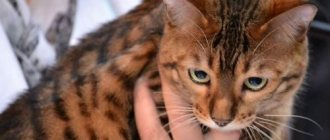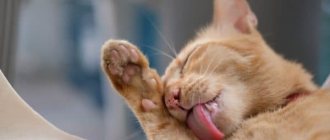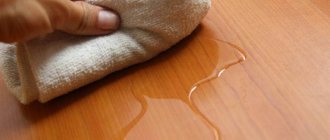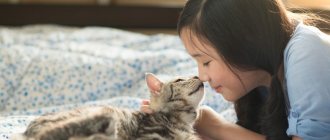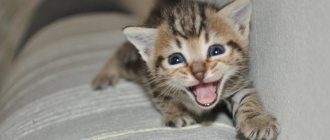There may be several reasons for this behavior. Most often, this is how she shows her love for her owner. Females lick their kittens, thereby ridding them of foreign odors and taking care of them. Therefore, when a cat licks a person, it thus shows its affection for him and “helps” get rid of what it considers foreign odors. After all, for them this is a very important and intimate moment in hygiene. According to another theory, by licking the owner’s fingers, she tries to attract attention to herself and begs for the next portion of delicacy.
TOP main reasons
1. In first place in the TOP 7 reasons why cats lick people is the communication factor. It is known that smell is of great importance for these animals. There are special glands on their body that produce odorous substances. In this case, the tail glands are responsible for substances that carry group information, and the head glands are responsible for more individual information. Thus, by licking the owner and then applying fresh marks, our pet is trying to leave a message.
2. Expression of affection – the theme of pheromones continues. Animal psychologists explain our attachment to furry creatures by the presence of these substances. By licking the owner and then wiping itself with its muzzle, the animal applies its own scent, thereby designating the person as “one of its own.”
3. Hygiene. This reason logically follows from the previous one - obviously, the cat is interested in the creature she loves so much being just as clean and tidy as her. In addition, in the wild, the smell can attract an enemy, therefore, in order to protect the owner from a potential enemy, a caring fluffy will carefully rid the owner of the treacherous smells of perfumes and other aromas.
4. Manipulation. In some cases, a cat licking a person may indicate a desire to play, or an attempt to hint that it would be nice to treat it with something tasty.
5. The cure for boredom is a lack of impressions, a way to have fun. Animal psychologists say that domestic cats are more prone to licking their owners and these sissies do this due to a lack of impressions. This is why cats lick their lips to touch people - it turns out they are expecting an emotional reaction!
6. A way to show your leadership position. This is how a caring mother cat takes care of the children she cares for.
7. Cure for stress. The furry tongue massages the skin and promotes the production of endorphins. And a cat’s fur coat contains a substance that normalizes mental balance. By licking its skin, a cat also takes care of a person when it feels that he urgently needs to calm down. Thus, fluffies are able to relieve homo sapiens from depression, stress and bad mood.
Hands taste like something else
Even if you haven't eaten anything tasty, your cat may like the taste of something on your hands. This may include lotion and soap, which some cats enjoy. Soap and lotion are usually made from animal fats. Those with higher numbers may be more prone to licking.
Of course, cats tend to only like certain soaps and lotions. Not every soap or lotion will suit everyone. Thus, it is not uncommon for a cat to lick your fingers only after you have applied a certain lotion or soap. They like one and not the other.
In what situations do cats lick their heads?
If you woke up to your tailed pet selflessly licking your head, you can consider several reasons, and the main one is a passion for cleanliness. Probably, the cat considers the smell of shampoo too strong, or simply demonstrates the tenderness that it shows towards its own kittens. One of the reasons for this behavior may be the desire for dominance.
In the same list of reasons for the cat’s interest in the owner’s head, there is also a lack of attention. If this behavior of your furry pet causes discomfort, it is easy to wean her off it with the help of her favorite games and attention. If you can’t retrain your cat on your own, a specialist will always help.
How to stop
Stopping your cat from excessive licking can be difficult. This behavior is often rooted in love and affection, so it can be difficult to stop without damaging your relationship.
The best way to prevent licking is to redirect your cat's actions. For example, if your cat is about to lick your face, simply move her away from your face and pet her instead. You can also move away from your cat when she starts licking. This causes her to associate licking with you disappearing.
Why do cats lick their owner's face?
When a cat licks its owner's face, this may indicate two things. Firstly, that she looks after the owner, considering him a large cat who does not know how to take care of himself and provide proper care. Animal psychologists, figuring out why cats lick people, found another reason - the desire to mark the owner as property. In a cat group, licking is known to help create a common scent that allows group members to be recognized.
Is your cat sick?
There is also some not entirely pleasant information about why cats lick themselves and their owners. According to one version, the cat reacts with this behavior to skin diseases or parasites. In order to accurately determine whether there is any need to worry, the animal must be examined by a doctor. Beforehand, at home, you can identify whether there are reasons to worry. Rashes, dermatitis, and lichen will be noticeable. But to find out whether there are worms, monitoring the cat’s appetite, its well-being and feces will help.
You will be able to notice from the behavior of the predator what the mystery of this phenomenon lies. When she licks her owner's hands, she can do it with love or confusion. Observe your pet's behavior. Perhaps she just wants to show how she feels about you.
Why do furry pets lick their skin?
If cats show increased attention to the owner's skin - hands, or face, and especially when they lick armpits, it can be assumed that they need pheromones. The fact is that sweat contains hormones similar to substances with which cats attract the opposite sex. Thus, the pungent smell of sweat has a calming effect for cats. In a similar way, these animals react to catnip, valerian and mint, which have a very relaxing effect on furry pets. It is possible that your pet simply does not have enough salt with sodium and other minerals.
Licking kittens and humans: what are the similarities?
It is not without reason that a cat shows care by licking. Even in childhood, your mother cat took such care of your pet. This action is associated with pleasant emotions that are associated with safety and protection. Have you noticed how a cat licks kittens? In fact, there is something similar in the behavior of a pet with a person. Cat love manifests itself in different ways, but it is through licking that the mother takes care of the kitten. She hides him from predators by licking his scent, and also teaches him to care for her fur. But even in the usual washing of children, the cat shows maternal affection.
In other cases, the owners observed that small predators can also lick each other. If your cat shows you such caring attitude, then he perceives you as part of his family.
Why do cats lick people's hands?
Cat owners sometimes notice in their pets a habit characteristic of dogs - hand licking. In fact, this is completely normal behavior. The first explanation is the most common desire to show affection and love to its owner. Some cats are convinced that such behavior is obligatory at the moment when the owner strokes them. However, there are cases when this form of expression of affection takes on a manic character - the licking of the pet’s hands becomes so obsessive that it can distract from everyday activities, from work, and even interfere with sleep if it happens during sleeping hours.
This behavior is typical for a cat that has recently had kittens - thus, she shares an excess of tenderness and care with her owner. In this case, stopping the cat’s distracting actions is quite simple - just move her to the kittens and her attention will switch to them.
All of the above reasons do not require special attention or concern. But when such behavior is not associated with the manifestation of maternal instinct, or the desire to express affection, it is worth contacting a specialist, since licking the owner’s hands in some cases is a signal of pathological processes in the body, or severe stress in the animal. In this case, you need to urgently call the veterinary clinic and consult - the doctor will make an appointment, carry out diagnostics and prescribe the correct treatment.
See also: causes of homosexuality in cats
Symptoms of diseases
There are cases when licking people is a desire to draw attention to the pet’s health problems, and not a show of love or a request for affection. These may be diseases or conditions such as:
- Skin parasites, including fleas. The cat worries not only about itself, but also about the people around it, and is trying to get rid of the problem.
- Allergy. If feeding is incorrect or the food is changed, skin problems can occur, which leads to excessive licking of yourself and those around you.
- Disturbances in general health. By licking frequently, the animal tries to signal that something is wrong with it. It is important to notice changes in behavior and contact a veterinarian promptly.
- Infectious diseases. Some of them cause itching and rashes on the skin, which irritates the pet and he tries to get rid of it in this way.
Symptoms that require you to contact your veterinarian
The help of a veterinarian is necessary when pathological causes are confirmed. They can be recognized by the following symptoms:
- increased salivation;
- weak cough, wheezing, blue mucous membranes and other signs of suffocation;
- prolonged refusal to eat, including the cat’s favorite treats;
- unpleasant odor from the mouth;
- abnormal stool (change in consistency and color, as well as the appearance of foreign matter);
- prolonged apathetic state and sleep disturbance;
- frequent or intense vomiting.
An accurate diagnosis can only be made based on tests, so do not rush to treat your pet with advertised drugs. Incorrect treatment can aggravate the situation, even leading to death.
Taking care of hygiene
Well, of course, when licking a person, a cat tries to clean his “skin”, just as she is used to caring for her kittens. In the wild, a strong smell can give away an animal and attract an enemy. To destroy it, the cat will carefully lick hands washed with scented soap or neck or hair scented with shampoo.
You should not show your cat dissatisfaction with such a toilet. If you often drive a cat away, avoiding its rough tongue, the emotional connection and trust in the person may be disrupted. Saving him from danger, endowing him with the aromas of his “group”, the cat expects recognition and affection in return.
Cleansing a person from sharp, unpleasant or alien aromas, the cat exchanges its pheromones with the owner, so that the person, even at a distance, feels an emotional connection with his pet and does not forget about him.
Obeying the basic instinct
The periods of cat “weddings” are known for their riotousness - and individuals of both sexes are prone to an enchanting outpouring of feelings. Expressing desire with inviting cries, characteristic poses and “fragrant” marks, but not being able to find a partner, temperamental pets can “trample” with their paws or bite the owner, lick him annoyingly and rub his whole body, marking him with his smell.
Cats sometimes imitate mounting and mating by squeezing a person's hand with their teeth, just as they would grab the scruff of a cat in heat.
Showing love
And yet, no matter how arrogant and isolated cats may be, they also know how to sincerely love their owner! They demonstrate their warm feelings by licking his hands, head and other parts of the body. Therefore, if you are wondering why a cat licks its owner’s face and what it could mean, know: she just loves him!
This method of transmitting positive emotions in purrs is laid down from a very early age, when the mother cat licks her babies, caresses them and takes care of them in every possible way. It has been scientifically proven that animals feel the mood of their owners very well; they are able to empathize with them, be happy and sad with them. Moreover, they also want to receive affection and care in return. But if the owner is in no hurry to show his warm feelings, the cat can easily take the first step and caress his owner, encouraging him to stroke or scratch himself.
The language of communication
Mutual licking is a ritual common to all cats. Thus they strive to:
- Demonstrate the anatomy of feelings . By licking the area of the cheeks, arms, ears and chin, the pet seems to be kissing a person and automatically puts an o.
- Show the owner that he is the closest and dearest . Living as a pet outside of communication with its fellow tribesmen, the cat switches its emotions to humans. Grateful for food and care, the pet tries to be as close to the owner as possible in order to rub its cheek or lick an area of exposed skin: face, neck, fingers, ankle. The sincerity of feelings is indicated by closed eyes and a quietly vibrating “internal motor” that turns on in cats at the moment of receiving positive emotions. Some cats love to lick the hair of their owners, hugging their paws around the neck or sitting next to them on a pillow.
Therapeutic measures
Constant licking of fur is not a separate disease, but a symptom of a certain pathology, so treatment is selected individually, depending on the diagnosis:
- If the cause of the symptom is diseases such as allergic reactions to food or hygiene products, local spectrum drugs are prescribed - ointments and creams that eliminate unpleasant symptoms, itching and burning. To prevent allergies from occurring again, you need to determine what exactly was the allergen, otherwise the discomfort will return again. In case of a severe allergic reaction, antihistamines are prescribed for internal use.
- Infections and inflammations on the skin of infectious origin require a course of antibiotics.
- If a fungus has been identified, antifungal medications are prescribed.
Also watch the video why cats lick themselves so often:
Feeling from childhood
Owners know that mother cats tirelessly clean and wash their furry babies. This behavior can be compared to parental kisses and hugs in the human world. Accordingly, the cub learns to give warmth and care.
According to eyewitnesses, a person who feeds a kitten from a pipette and replaces its mother cat often becomes the object of strong reciprocal feelings.
The image of a close being imprinted in infancy and the associated pleasures find their manifestation in subsequent communication. Having become accustomed to having a treasured container of milk in a person’s hands, a grown-up cat will purr, caress, lick and suck fingers, anticipating a hearty meal.
Tags
about cats InformationalMy Cat LicksMy Cat LicksSome cats like to bother. Cats attach Many cats also If cats feel diligent cats can your cats in Why do cats like of which daily smell of which can bear kittens in Why is a cat not like a kitten If a cat licks a natural kitten and like a kitten gives a newborn kitten The cats have The cats in The cats have clumsy cats and love cats Breeds of cats. modern cats tried out cats in Why My Why My Why cats Why cat
breeds article and dog comment makes furry pets tries cat content gives you back one site problems years
To maintain cleanliness
Self-licking is a natural and very common mechanism for caring for one's own body in the animal kingdom.
Kittens begin to lick themselves from the age of four weeks, and before that, all manipulations regarding the infant toilet are performed by the parent.
Cat licking rituals like these are a demonstration of love for cleanliness:
- The cleanest . Sometimes it seems that keeping oneself clean is the main task of a feline brother. Taking the most graceful poses, Murka licks herself for hours, touchingly washes her face with her paws and rubs her ears. She does this many times a day: after sleeping, feeding, taking care of her natural needs, and even stroking her. A cat's tongue, covered with miniature hooks and therefore rough to the touch, combs and arranges hairs like a brush, removing dirt and foreign odors. During this massage, blood flow is stimulated and the skin glands intensify the production of an oily secretion, which lubricates the hair and protects it from moisture.
- “No” to foreign odors . The desire to lick a person may be motivated by the desire to destroy unusual scent marks. According to the cat's understanding, all perfumes, including perfumes, soaps, shampoos and creams, have unnatural and even unpleasant odors, which must be urgently gotten rid of. This is why the cat spends so much time and carefully licking its own area of the body with medicinal ointment applied to it.
- Tempting aromas . Some cosmetics, on the contrary, can be very attractive to mustachios. Such, for example, is a hand and nail cream with an extract of medicinal valerian, which has a magical effect on cats and activates the owner’s obsessive licking. Some cats love the smell of peony tincture and therefore tend to lick the hands or lips of a person who has taken this sedative. Cats are also attracted to human sweat, which contains odorous substances similar to animal pheromones. So the owner, returning from a morning jog or after a hard work shift, smells very attractive to the murka.
Attention
Some cats may lick their hands to get attention. Usually it's just one click. Then your cat will sit back and stare at you. This usually means they want to be petted or held. However, it could also mean that they need you for something else, such as opening the door or refilling their food dish.
© shutterstock
This licking is clearly different from other types. In most other cases, the cat is going to lick you several times. However, licking when they want attention is only a means to an end, so they will stop licking when they get what they want.
If an unpleasant habit appeared after the castration procedure
The fact that an animal licks itself non-stop after sterilization is a normal, understandable phenomenon. After surgery, when the incision scar begins to heal, this process is accompanied by severe itching and burning. It is not surprising that the cat will try to relieve discomfort by constantly licking the skin.
But it is important for the owner to understand what this can lead to. If the suture is constantly wet after surgery, this will lead to poor and too slow healing and increase the risk of secondary infection.
To protect against negative consequences, the pet is recommended to wear a surgical collar for 10 days after castration, until the suture finally heals.



